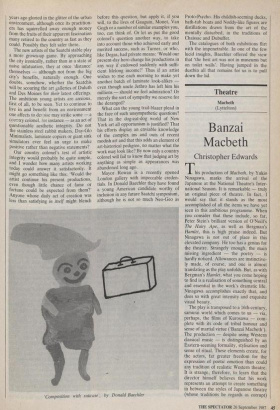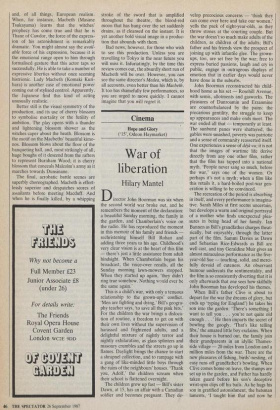Theatre
Macbeth (Lyttelton)
Banzai Macbeth
Christopher Edwards
This production of Macbeth, by Yukio Ninagawa, marks the arrival of the Japanese at the National Theatre's Inter- national Season. It is remarkable — truly an original piece of theatre. In fact, I would say that it stands as the most accomplished of all the items we have yet seen in this ambitious programme. When you consider that these include, so far, Peter Stein's brilliant version of O'Neill's The Hairy Ape, as well as Bergman's Hamlet, this is high praise indeed. But Ninagawa is not out of place in this elevated company. He too has a genius for the theatre. Strangely enough, the main missing ingredient — the poetry — is hardly noticed. Allowances are instinctive- ly made, of course, and one is almost translating as the play unfolds. But, as with Bergman's Hamlet, what you come hoping to find is a realisation of something central and essential in the work's dramatic life. Ninagawa accomplishes exactly that, and does so with great intensity and exquisite visual beauty.
The play is transposed to a 16th-century, samurai world which comes to us — via, perhaps, the films of Kurosawa — com- plete with its code of tribal honour and sense of martial virtue (`Banzai Macbeth'). The production — despite using Western classical music — is distinguished by an Eastern-seeming formality, stylisation and sense of ritual. These elements create, for the actors, far greater freedom for the expression of poetic emotion than could any tradition of realistic Western theatre. It is strange, therefore, to learn that the director himself believes that his work represents an attempt to create something in between the styles of Japanese theatre (whose traditions he regards as corrupt)
and, of all things, European realism. When, for instance, Macbeth (Masane Tsukayama) learns that the witches' prophecy has come true and that he is Thane of Cawdor, the force of the express- ion of his astonishment is remarkably dramatic. You might almost say the avail- able force of his expression, because it is the emotional range open to him through formalised gesture that this actor taps so successfully. He is able to take a number of expressive liberties without once seeming histrionic. Lady Macbeth (Komaki Kuri- hara) is another case of emotional power coming out of stylised control. Apparently, the Japanese find this kind of acting unusually realistic.
Better still is the visual symmetry of the production, and its use of cherry blossom to symbolise mortality or the futility of ambition. The play opens with a thunder and lightening blossom shower as the witches caper about the heath. Blossom is the motif on the Macbeths' beautiful kimo- nos. Blossom blows about the floor of the banqueting hall, and, most strikingly of all, huge boughs of it descend from the rafters to represent Burnham Wood; it is cherry blossom that conceals Malcolm's army as it marches towards Dunsinane.
The final, acrobatic battle scenes are superbly choreographed. Macbeth is effort- lessly superior and despatches scores of assailants before meeting Macduff. And when he is finally killed, by a whipping stroke of the sword that is amplified throughout the theatre, the blood-red moon that has hung over the set suddenly drains, as if cleansed on the instant. It is yet another bold visual image in a produc- tion that abounds with them.
Bad news, however, for those who wish to see this production. Unless you are travelling to Tokyo in the near future you will miss it. Infuriatingly, by the time this review comes out, the absurdly short run of Macbeth will be over. However, you can see the same director's Medea, which is, by all accounts, even better than his Macbeth. It too has shamefully few performances, so you are urged to move quickly. I cannot imagine that you will regret it.































































 Previous page
Previous page